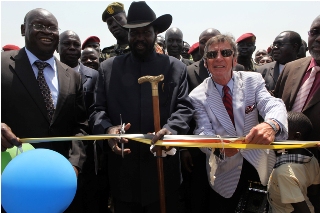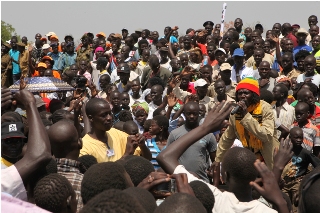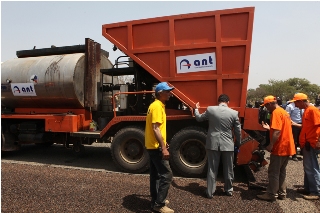USAID and South Sudan launch $225 million tarmacing of Juba-Nimule Road
By Richard Ruati
February 11, 2011 (NIMULE) – On Thursday the President of Southern Sudan Salva Kiir Mayardit and U.S. Consul General to Juba, Ambassador R. Barrie Walkley inaugurated a project to tarmac 192km of the Juba-Nimule Road with a ceremony near Nimule, Eastern Equatoria state.

The inauguration of the Juba-Nimule Road project follows closely on the heels for the inauguration of another USAID-funded Kapoeta Power Project conducted on February 4 as part of the U.S.-Southern Sudan relationship.
This project underscores the shared sympathy and long-term partnership between the U.S. Government and the people and Government of Southern Sudan, USAID says.
Speaking at Aswa Bridge where the ceremony was staged, Ambassador Walkley told a cheerful crowd that the “192-kilometer-long road is a living testimony of the partnership between the people of the United States and the government and people of Southern Sudan.”
Ambassador Walkley added that “the Juba-Nimule road is Southern Sudan’s highest priority road. It links Juba with Uganda, and is the most efficient route to the Port of Mombasa in Kenya. As we embark on the final phase of this project, it is important to recognize the hard work accomplished to get us to this stage today.”
On completion, the Juba-Nimule road will be the first major paved road to be constructed in southern Sudan since the signing of the Comprehensive Peace Agreement in 2005. The first phase of this project involved a feasibility study, engineering studies, repairs to existing bridges, and demining.
Economists in the region say that the Juba to Nimule Road is a vital link from Uganda to Juba and will aid the development of Southern Sudan. The construction of the road is being conducted in two phases; with the initial phase being the construction of seven new bridges at multiple locations along the route and which are now completed.
The next phase is the construction of the all weather sealed road being constructed in three sections. The Juba Nimule Road has been widened and expanded. It now two-way with one lane in each direction, including drainage on both sides.
Ambassador Walkley stressed that Completion of this economically vital road will catalyze business transactions between Southern Sudan and neighboring countries.” He said he hopes that “when completed, an estimated travel time between Juba and Nimule will be reduced from 8 hours at the beginning of the project, to about 2½ hours. It should be noted that already, more than 20 buses use this road every day to travel between Kampala and Juba.
He pointed out that “our support for roads development does not end with this road. USAID is also funding 260-kilometers of all-weather gravel roads in Western Equatoria state, and we plan to support the development of high priority agricultural feeder roads in the future. We will also continue to support the development of local Sudanese contractors, some of whom have played an important part in the construction of the Juba-Nimule Road. We hope the government will use these contractors to maintain these and other roads.”
President Salva Kiir was chief guest accompanied by the ministers of transport and roads, Anthony Lino Makana, minister of investment, Oyai Deng, minister of finance, David Deng Athorbei and minister of presidential affairs, Cireno Hiteng.
Others on the guest list were were, Eastern Equatoria governor Louis Lobong Lajore and Central Equatoria state governor Clement Wani Konga, as well as state ministers and honorable members of parliament at different levels and community leaders.

Speaking on a podium next to the Aswa bridge President Kiir said he attended the ceremony, because the “Juba-Nimule Road is the lifeline of the people of southern Sudan and it links Southern Sudan with our brothers and sisters in Kenya and Uganda.”
President Kiir said that the government was working to ensure that all parts of the region are accessible through road construction, rehabilitation of deteriorated roads, and periodic and routine maintenance of the road network.
“A proper road infrastructure is a prerequisite for any favorable trade to take place because it affects the cost of doing business, especially in a war emerging country like Sudan without direct access to other countries,” he said.
President Kiir noted that the “Juba-Nimule road network will accelerate development path,” he thanked the U.S. government for what he termed a “very precious and big achievement right after the peaceful conduct of southern referendum.”
Last week results from South Sudan’s referendum agreed as part of the 2005 CPA saw an overwhelming vote for secession. The South will become independent in July.
President Kiir recalled that during the civil war he had ordered SPLA commander Oyai Deng to destroy the Aswa bridge to preventing Northern soldiers from recapturing Nimule town.
Anthony Lino Makana, minister of transport and roads said he was thrilled to witness the first tarmac of highway in Southern Sudan so soon after the South Sudan referendum.
He revealed that “under the wise leadership of SPLM (the south’s ruling party) and spearheaded by President Kiir, Southern Sudan has rehabilitated 7,000-km of trunk roads and upgraded about 100 bridges in six years.”
However, as the Juba-Nimule is being paved, there is an increase in fatal road accidents as a result of high speed and increase in daily commercial traffic between Uganda and Southern Sudan.
Makana warned of the risks involved with road accidents and he appealed to U.S. government and other donors “to strengthen the capacity of traffic police so that they stand up to the challenge of curbing the much needed road safety measures. “
In his concluding speech Ambassador Walkely said USAID is already supporting the ministry of transport and roads and the ministry of interior to initiate programs to improve road safety, including road signs, road markings, billboards, and community outreach.
The inaugural ceremony drew visitors from Kenya’s ministry of roads and Uganda’s national road authority. Both officials emphasized and promised to implement the same road tarmac from their various border points linking Southern Sudan.

The Louis Berger Group Inc, through its three subcontractors Eyat Roads and Bridges, Gulsan Insaat and ANT Insaat, under the Sudan Infrastructure Services Project (SISP) are implementing the project on behalf of the South’s ministry of transport and roads.
The work will use a double bituminous seal treatment (DBST), a hot bitumen (binder), placed on a prepared surface overlaid with stone chips. The process is repeated twice.
Three senior officials from Louis Berger Group (LBG) attended the historic event including their President Larry Walker, Chairman of the Board Fred Berger and SISP Chief-of-Party, Dave Little.
SISP provides critical public infrastructure and related activities throughout Southern Sudan that support the successful implementation of the Comprehensive Peace Agreement and the development of Southern Sudan.
In blistering heat, local traditional dancers expressed a sense of happiness by showcasing their cultural dances as a sign of welcome to their important visitors.
Angelo Kenyi a resident of Pageri few kilometers from Aswa bridge along the Juba-Nimule road said it was a well placed piece of infrastructure, Which had strategic importance “that will fast-track South Sudan development.”
He added that “I am waiting keenly for the day when they finalize the Juba-Nimule road. It’s much more scenic and probably a little more direct.”
Construction is well under way at three sections; between 0 and 55,000km by August, 55,000km 125,000km by December and 125,000km to 192,000km by February 2012.
Infrastructure in South Sudan is still recovering after a 22 year civil war with the North that ended in 2005.
(ST)

Dito
USAID and South Sudan launch $225 million tarmacing of Juba-Nimule Road
Good move mr president and the USAID authority.
One step at a time and we shall reach to our destiny of modernization.
Logwanga
USAID and South Sudan launch $225 million tarmacing of Juba-Nimule Road
Dear Readers
Instead of cerebrating $225M road project,i thought civilians life where important than launching projects,now where is the emergence security meeting to thwart the security situation in Fangak areas or did i miss understand fangak’s cililians are being killed by Athor Terrorist.wow what a country?i’m real afraid where our country will heading to,in a real world,what is going in southern sudan is joke,not real a governce.
stay bless